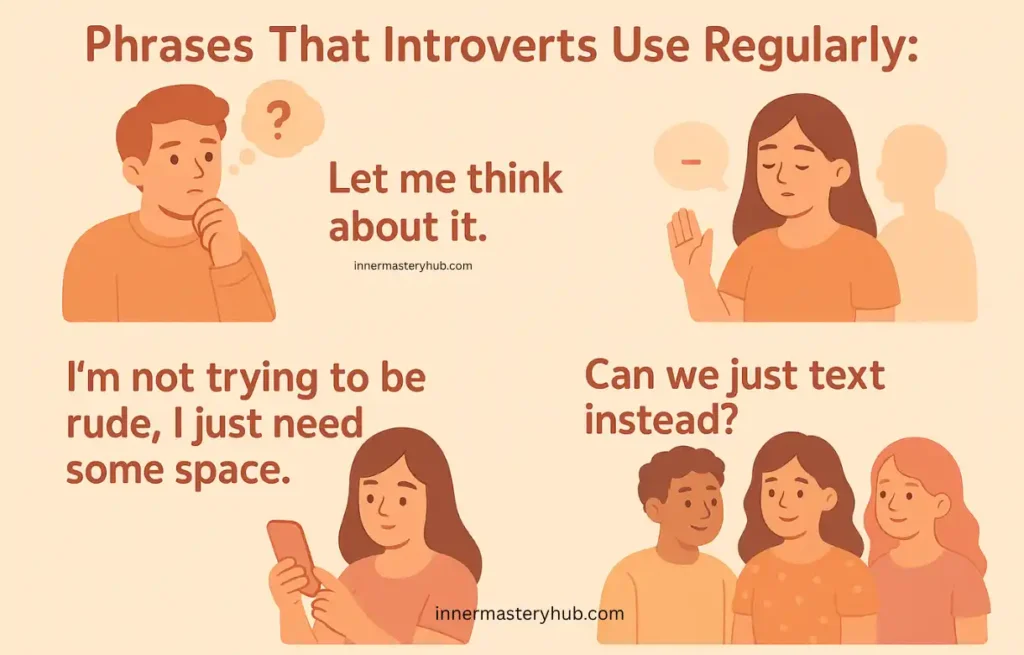10 Quiet Phrases Introverts Use Regularly To Protect Their Energy

When you start paying attention to the small patterns in your daily conversations, you may notice that certain phrases that introverts use regularly carry a gentle honesty, a sense of calm, and a desire for meaningful connection.
If you feel drained in crowded rooms, struggle to speak up when you want to, or find comfort in quiet company, you already recognize the phrases introverts use regularly. Many people mistake introversion for shyness, but the two are distinct traits. Introverts recharge internally, while extroverts draw energy from outside stimulation. That natural difference shapes the speech patterns introverts develop over time, often without even realizing it.
You may have spent years feeling misunderstood because your communication style doesn’t always match the pace of those around you. Maybe you’ve been told you’re too reserved. These labels can easily settle into your confidence and make you feel as if something is wrong with your way of speaking. But psychological studies from the past decade confirm that introspection, slower verbal processing, and selective social engagement actually strengthen creativity, emotional stability, and problem-solving.
Common Phrases Introverts Use Regularly
I just need a minute.
You’ve undoubtedly used this phrase as an introvert while you were feeling overwhelmed. It’s not a justification for avoiding people. It’s how you safeguard your mental acuity. Because introverts receive information through deeper cerebral pathways, too much stimulation at once might impair mood or slow down thought processes, according to cognitive science research.
When you say use this phrase, you’re requesting a moment to relax, take a deep breath, and let your mind function at its own rate. Stepping away isn’t retreat, as many introverts discover early on; instead, it’s a preparation for calmly and purposefully returning to conversations.
I’m good with something low-key.
When someone asks you about your plans for the weekend, you often say this. Even though you like interacting with people, you can easily become exhausted by loud environments or chaotic group dynamics. Because your brains are more susceptible to dopamine stimulation, introverts expend social energy more quickly.
You’re not being dull when you say this phrase. You’re opting for equilibrium rather than exhaustion. There have undoubtedly been times when you consented to an exciting outing only to be worn out midway through. You can conserve your energy while remaining receptive to connections with this simple statement.
Let me think about it.
You may not realise how often you say this. It illustrates your natural tendency to consider options thoroughly rather than responding on impulse. Rushing decisions can make introverts uncomfortable, as they rely more on internal processing before responding.
You are not avoiding accountability when you use this term. You are opting for clarity over impulsivity. Even though people sometimes misinterpret your pause as reluctance, this habit probably helped you make informed decisions over time.
I’d rather listen for a bit.
Before participating in a conversation, you could feel more at ease listening. This isn’t because you don’t have opinions; instead, it’s because you would rather understand the situation before voicing them. Introverts actively listen more deeply than extroverts, enabling them to discern tone, emotion, and intention more accurately.
When introverts use these phrases, they allow themselves to learn before speaking. When you do choose to talk, you may have observed how this helps you to offer more insightful comments.

I’m not trying to be rude, I need some space.
This phrase is a polite way to set boundaries if someone misinterprets your need for alone time, as you have battled the guilt of turning down invites or seeking time alone for years. Introverts use quiet time to refuel their minds, and a lack of solitude can cause emotional exhaustion. When you say this phrase, you’re safeguarding your capacity to completely show up when you’re ready, not separating yourself from other people.
I enjoy small groups more.
Intimate get-togethers allow you to feel connected without feeling overwhelmed, as you have probably discovered via experience. Introverts do best in situations where they can focus on a few people rather than divide their attention among large groups. This expression does not criticise the preferences of others. It’s a recognition of what gives you a sense of engagement and presence. Your selection of smaller groups shows your depth and most genuine self.
I’m already doing something that day.
“Doing something” can sometimes refer to a personal endeavour, reading, relaxing, or just spending a peaceful evening at home. Without explaining your need for downtime, you’ve most likely used this term to avoid disappointing someone.
Because they fear misinterpretation, many introverts are reluctant to be honest about their boundaries. However, studies consistently demonstrate the importance of personal downtime for cognitive repair. Even if you don’t always say that sentence aloud, when you use this phrase, you’re keeping your word to yourself.
Can we just text instead?
You already know how much power this affords you if you’ve ever selected a message over a phone call. You may connect without feeling pressured, think things through before reacting, and avoid unexpected emotional overload by using messaging. Introverts choose written conversations because they allow them time to think.
I don’t have anything to add right now.
Sometimes you are completely engaged in a conversation and don’t feel the need to fill in the gaps. You value significant pauses because they help you in determining the significance of your contribution. Conversations that are more focused and grounded are the result of this communication approach. This behaviour comes naturally to many introverts, and when used honestly, it reduces needless conversation and creates trust.
I’m comfortable just being here.
This phrase reflects your appreciation for quiet companionship. You don’t need constant conversation to feel connected. Many people with introverted personalities value quality over noise, and emotional closeness over performative engagement. Shared silence can be just as powerful as spoken communication. If you use this phrase often, you’re expressing a deeper level of comfort and trust.
You could start to realise how much of your communication is influenced by self-preservation, emotional awareness, and a need for genuineness as you consider these common introvert expressions. These are expressions of your true self, not just defences or justifications. Each phrase is a tiny compromise that helped you stay true to yourself in situations that occasionally asked too much. You’ve likely spent years managing societal expectations that didn’t match your natural rhythm.
Although you might think that these patterns restrict you, they really safeguard your capacity to form deep connections. Instead of avoiding people, you are interacting with them in a way that keeps you grounded.
Respecting your communication style helps you reduce stress, improve your self-awareness, and create mutually respectful relationships. You can enter conversations with confidence rather than self-doubt by recognizing these phrases.
As you proceed, make an effort to observe the instances in which you employ these terms. They make your needs, thoughts, and sense of security clear. It gets simpler to talk honestly and guilt-free the more at ease you are admitting those desires. To blend in with noisy environments, you don’t have to alter your natural rhythm. All you have to do is comprehend the language you already use and provide yourself permission to use it intentionally.
Ultimately, introverts’ common phrases that Introverts use regularly are subtle tools that enable them to talk to the world on their own terms rather than being restricted. You are honest, thoughtful, and have depth in your communication. Even if they don’t say much, such attributes are essential.
FAQs About “Phrases That Introverts Use Regularly”
What are common phrases that introverts use regularly?
Introverts often say things like “I need a minute,” “Let me think about it,” “I’m okay with something low-key,” and “I’d rather listen first,” which help them manage energy and communicate comfortably.
Why do introverts use these phrases so often?
These phrases introverts use regularly reflect their need for mental space, quiet environments, deeper processing, and meaningful interactions rather than fast-paced conversations.
Are these introvert phrases signs of shyness?
Not necessarily. Introversion and shyness are different. Introverts may use quiet or reflective phrases because they prefer calm communication, not because they’re afraid to speak.
Do introverts avoid conversations when they use these phrases?
No. Introverts typically seek thoughtful, intentional communication. Their phrases often help them engage without feeling overwhelmed.
What does it mean when an introvert says, “I need space”?
It usually means they need time alone to recharge mentally. Solitude restores their energy and helps them re-engage later with clarity.
Why do introverts prefer texting over phone calls?
Texting allows them time to process their thoughts before responding, reducing pressure and overstimulation that can happen during live calls.
Are introverts uncomfortable in groups when they use these phrases?
Group settings can drain their energy faster, so phrases like “something small” or “I prefer small groups” help them choose environments where they can show up fully.
Do these introvert phrases affect relationships?
Only if misunderstood. When partners, friends, or coworkers understand these phrases, communication becomes smoother and healthier.
How can you respond positively to introvert phrases?
Give them space, respect their slower pace of dialogue, and engage in meaningful topics rather than forcing quick responses or high-energy plans.
What are some common Phrases That Introverts Use Regularly?
Phrases That Introverts Use Regularly include gentle ways to protect their energy, like “I need a moment,” “I’m okay being alone,” or “Let’s text instead.” These phrases help introverts set boundaries, recharge quietly, and stay comfortable without overwhelming social pressure.
How can Phrases That Introverts Use Regularly help in communication?
Phrases That Introverts Use Regularly help others understand when introverts need space or quiet time. These expressions reduce confusion, prevent overwhelm, and support more transparent communication. Recognizing these phrases makes interactions smoother by respecting emotional comfort, personal boundaries, and energy levels.
Are Phrases That Introverts Use Regularly different from extroverts’ phrases?
Yes, Phrases That Introverts Use Regularly often reflect a preference for calm, reflection, and personal space. Introverts may say things like “Let me think first” or “I’m staying in tonight,” while extroverts lean toward social engagement, quick responses, and energetic invitations.
Can learning Phrases That Introverts Use Regularly improve relationships?
Learning Phrases That Introverts Use Regularly can improve relationships by creating empathy and reducing misunderstandings. These phrases help others recognize when introverts need quiet time, slower conversations, or emotional space. Respecting these patterns builds trust and supports more balanced, comfortable interactions.






